|
|
|
Sort Order |
|
|
|
Items / Page
|
|
|
|
|
|
|
| Srl | Item |
| 1 |
ID:
113098
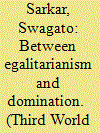

|
|
|
|
|
| Publication |
2012.
|
| Summary/Abstract |
This article presents the problem of governing differences as a problem of constituting a social whole out of the play of antagonistic elements like class, caste, gender, religion, etc, which is essentially a modernist political project in its normative grounding. The problem is explored here vis-à-vis the trajectories of global capitalism and the options for development (that is, the transition from an agrarian economy to an industrial one) for the smaller federal states. The experience of the Left Front Government in West Bengal, India is analysed to understand the issues at stake. The narrative presented in the article shows that questions of land ownership and freedom from oppression and bodily toil remain the fundamental political problem which determines the course and dynamics of governance of differences, particularly its egalitarian mode. This problemat also points towards the limits of agrarian modernity, which many post-colonial countries have tried to constitute.
|
|
|
|
|
|
|
|
|
|
|
|
|
|
|
|
| 2 |
ID:
094851
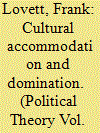

|
|
|
|
|
| Publication |
2010.
|
| Summary/Abstract |
When should burdened social practices be granted special accommodation? One issue of concern-raised by Okin and others-is that some social practices involve domination, and so the accommodation of those practices might (inadvertently, perhaps) support social injustice. Suppose one wants to take this concern very seriously. Starting from the assumption that freedom from domination is an especially important value, this article examines whether cultural accommodation would ever be advisable. Approaching the problem of multicultural accommodation from this point of view greatly clarifies the debate and yields some interesting results. In particular, the discussion concludes that there are circumstances under which the goal of minimizing domination itself would be furthered by policies of special accommodation.
|
|
|
|
|
|
|
|
|
|
|
|
|
|
|
|
| 3 |
ID:
149686
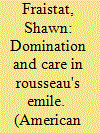

|
|
|
|
|
| Summary/Abstract |
Domination, understood as the abusive or capricious employment of power over others for the sake of one's own ends, is among the gravest threats to human freedom. Solving the problem of domination is a crucial normative challenge, and this article identifies in the work of Jean-Jacques Rousseau a promising and overlooked avenue for addressing it. I propose an interpretation of Rousseau's Emile in which preventing domination requires moral education in the practice and value of care. This interpretation gives Rousseau new relevance as a theorist of domination. In connecting non-dominative to educative care, Rousseau's approach has the potential to forge new connections between neo-republican theories of domination and feminist care ethics, even suggesting new routes by which public policy might foster a non-dominative society.
|
|
|
|
|
|
|
|
|
|
|
|
|
|
|
|
| 4 |
ID:
156804
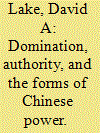

|
|
|
|
|
| Summary/Abstract |
The debate about China’s rise and future United States–China relations has focused on the purpose to which China’s growing international power will be put. This article focuses on the form of China’s power, distinguishing between domination and authority. Different great powers have, at different times, chosen one, the other, or more commonly differing mixes of the two forms. How China chooses now and in the future will have a significant effect on its relationships with other states, and through them on its relationship with the United States. The first section explores the differences between domination and authority as strategies for the exercise of international power. The second section summarizes a theory of authority with particular relevance to China today. Though necessarily speculative, this section identifies where China is most likely to choose one strategy over the other as its international influence expands. The final section examines the domestic impediments in China to the choice of authority. While both China and the United States might be better off in a world in which the former constructs an international hierarchy to parallel the latter’s, the conclusion draws a relatively pessimistic assessment of the prospects for cooperation between the two emerging superpowers.
|
|
|
|
|
|
|
|
|
|
|
|
|
|
|
|
| 5 |
ID:
101624
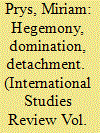

|
|
|
|
|
| Publication |
2010.
|
| Summary/Abstract |
The end of the Cold War has reinvigorated academic interest in the regions of the world, as well as in the regional powers and potential regional hegemons that inhabit them. Yet, what is missing, for regional research to be meaningful and successful, is a well-defined understanding of the variance of regional powers. An anomaly yet to be explained by the existent literature is, for instance, that these states, unlike what might be typical, and expected, for traditional hegemons, do not seem to provide public goods, such as order and stability, nor do they always have an extraordinary impact on the behavior of other states in their region. The driving impulse of this study is, thus, the question of why an 'achievement-expectations gap' can be observed in almost all cases of potential regional hegemons. This article, in specific, then makes the argument that in order to deal with this challenge, we need to move away from the implied assumption about the uniformity of these actors and, rather, that we should begin to deliberately think about the concept of a regional power as a variable that can take on different forms and values. The suggestion of a typology to study these important second-tier states is, therefore, at the heart of this article.
|
|
|
|
|
|
|
|
|
|
|
|
|
|
|
|
| 6 |
ID:
110221
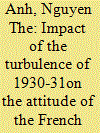

|
|
|
|
|
| Publication |
2011.
|
| Summary/Abstract |
The 1930-31 revolutionary outburst in Vietnam convinced the French administration that it needed to revitalize the local monarchy and create a living institution with initiative in decisions and reforms that would satisfy the Vietnamese people's aspirations. The Vietnamese emperor, Bao Ðai, was taken back to the imperial capital of Huê and given the task of conciliating 'the millennial traditions and disciplines of the past, indispensable to public peace, with the requirements, advances and freedoms inseparable from modern activity'. Yet this attempt to boost the monarchy's prestige was short-lived because the French administration went no further than a few measures aimed at modernizing the mandarinal machinery. The French will to mould the country's social structures into a passive state of tranquillity thus satisfied no-one, and could not help to develop a conservative ideology attractive enough to avert a revolution on the left.
|
|
|
|
|
|
|
|
|
|
|
|
|
|
|
|
| 7 |
ID:
084633
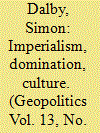

|
|
|
|
|
| Publication |
2008.
|
| Summary/Abstract |
Twenty years ago Gear id Tuathail called for an approach within Political Geography that made geopolitical culture and the formulation of foreign policy the object of analysis. He specified the task of what subsequently became critical geopolitics as the need to expose the complicity of geopolitics with domination and imperialism. After the cold war there was a decade when military matters declined in importance and globalisation confused the geographical designations of danger. In the aftermath of 9/11 the utility of force has been reasserted by a neo-Reaganite American foreign policy using military force in the global war on terror and the invasion of Iraq. Now the geopolitical culture is a matter of debates about empire and the appropriate geopolitical designation of danger, whether in Thomas Barnett's non integrated gap on "the Pentagon's New Map" or in the complex geographies of Alain Joxe's "Empire of Disorder". This re-militarisation of global politics clearly suggests the continued relevance of Tuathail's specification of the need for critical geopolitics to grapple with the culture that produces imperial attempts at domination in distant places.
|
|
|
|
|
|
|
|
|
|
|
|
|
|
|
|
| 8 |
ID:
155784
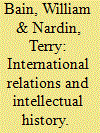

|
|
|
|
|
| Summary/Abstract |
The history of international thought has traditionally focused on a limited number of canonical texts. Such an approach now seems both naive and parochial. International Relations scholars often read their own ideas into these texts instead of getting ideas from them – ideas that if properly understood have the potential to undermine theirs. By ignoring non-canonical texts, we overlook resources that are not only necessary to establish the historical contexts of canonical writings but that can also help theorists of International Relations to understand their subject better. Judgements of what is and is not canonical are in any case themselves context-bound and contestable. Intellectual history can help us understand how the International Relations canon was constructed and for what purposes. It can also counter the abstractions of theory by reminding us not only that theories are abstractions from the activities of people living in particular times and places but also that our own theories are embedded in historicity. In these and other ways, paying attention to intellectual history expands the repertoire of ideas on which International Relations theorists can draw and against which they can measure their conclusions. The articles in this issue illustrate these points in relation to a wide range of texts and contexts. They suggest that whether one approaches international relations from the angle of description, explanation, policy or ethics, knowing how past thinkers have understood the subject can lead to better informed and more robust scholarship.
|
|
|
|
|
|
|
|
|
|
|
|
|
|
|
|
| 9 |
ID:
064845
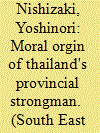

|
|
|
| 10 |
ID:
106416
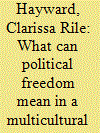

|
|
|
|
|
| Publication |
2011.
|
| Summary/Abstract |
This essay takes as its starting point an apparent tension between theories of democratic deliberation and democratic theories of multicultural accommodation and makes the case that many multiculturalists and deliberative democrats converge on an ideal of political freedom, understood as nondomination. It argues for distinguishing two dimensions of nondomination: inter-agentive nondomination, which obtains when all participants in a power relation are free from rule by others who can set its terms, and systemic nondomination, which obtains when the terms of a power relation itself are responsive to those they affect. Because inter-agentive and systemic nondomination do not covary, it is critical to distinguish between them, in order to build institutions and practices that promote both.
|
|
|
|
|
|
|
|
|
|
|
|
|
|
|
|
|
|
|
|
|